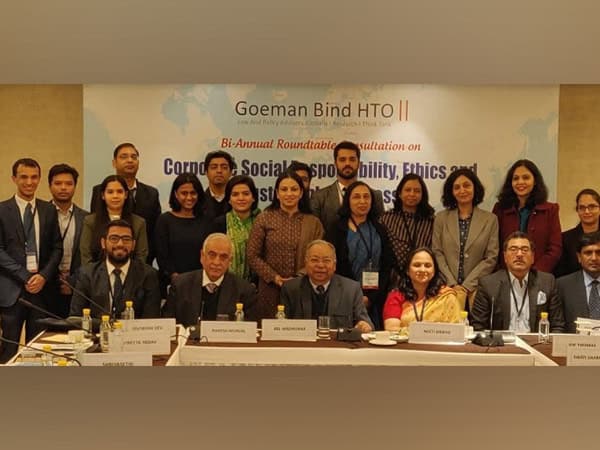New Delhi: Goeman Bind HTO, an international not for profit Think Tank and Research Advisory firm today held the Bi Annual Round table Conference on CSR, Ethics & Sustainable Business at The Indian Habitat Centre, New Delhi.
The aim of the round table was to bring in the business leaders, policy leaders, academia, senior government officials and leaders from think tanks & NGOs on one platform to discuss and deliberate the opportunities and challenges of CSR.
Some of the eminent personalities who attended the round table are Smt. Ratna Vishwanathan, Head, Strategic Partnerships – UNDP, Shri CS Ajay Goel, President, Society of CSR and Investor Protection, Dr. Samar Verma Sr. Program Specialist IDRC, Dr. Sanjay Goyal, Academician, Formerly Dean & Pro-VC, Dr. BBL Madhukar, Founder Director General of BRICS Chamber of Commerce & Industry, Former CMD, MMTC Ltd., Ms. Geeta Sekhon, Global Consultant, United Nations, Shri Rakesh Munjal, Managing Trustee, Delhi High Court Advocates Welfare Trust & Executive, Chairman, SAARCLAW – India Chapter, Shri. Hemant Batra, Founder & Chairman, Kaden Boriss and Vice President of SAARCLAW, Prof. Savita Gautam, Ph.D. Teri University, M.SC., JNU, Dr. Neeti Shikha, Expert Leader, Goeman Bind HTO to name a few.
The opening remarks were made by Shri BBL Madhukar (Founder and Director General of BRICS Chamber of Commerce & Industry) wherein Shri Madhukar laid emphasis on, “We should aim to look at the motive behind the companies CSR programs. CSR activities should be designed not only to meet the needs of the target stakeholders but should also be sustainable which is paramount to companies’ existence.
It should also be noted that many organisations undertake CSR only to comply with the law and not in its spirit. Also there is a need to put in place a system to gauge compliance where the programs can be evaluated and reported.”
The panel discussion on “Corporate Social Responsibility, Ethics and Sustainable Business” was moderated and chaired by Shri BBL Madhukar. The discussion majorly focused on accessing the mandatory CSR regime in India and evaluating their ethical dimension. The round table also talked about the CSR expenditure, its beneficiaries and drive towards business sustainability. The panel also discussed about the role of having CSR as an alternative funding source for all developmental projects in the country.
Commenting at the roundtable, Dr. Neeti Shikha, Expert Leader, Goeman Bind HTO said, “India’s CSR landscape requires more evidence based research for channelizing funds effectively. There is a huge disparity in the need for CSR amongst various states and the channelization of funds. Often the funds are provided to states which are relatively well off or those states that have a huge industrial/resource base. As per our research paper it thus shows that CSR is not being used effectively to address the socio-economic needs of the Country. Various organisations along with the government should also look at creating a policy framework for effective allocation of funds in a need based manner and ways to measure on-ground effectiveness.”
Dr. Sanjay Goyal, Academician, Formerly Dean & Pro-VC Designate said, “We need to look at CSR in terms of its requirements not only today but 30- 40 years from now. It is important to engrain the concept of shared value between business and societies to make CSR more intrinsic to our society. We need to look at creating platforms where 100% of the businesses goals are aligned for value generation for both business and society.”
The round table discussion brought together various stakeholders to explore and deliberate on channelizing CSR expenditure by the companies as a new opportunity at hand. The group discussed how government policies should be designed to see the mandatory CSR contribution as an investment rather than a legislative burden.
The panel also discussed that there is requirement to revisit the policies so that the distribution of such funds can be used for regions where development is needed the most. The panel also concluded that CSR contribution from India’s listed companies can be used as a great source for funding development projects in India, which will eventually make both society and business more sustainable.
[source_without_link]ANI[/source_without_link]

